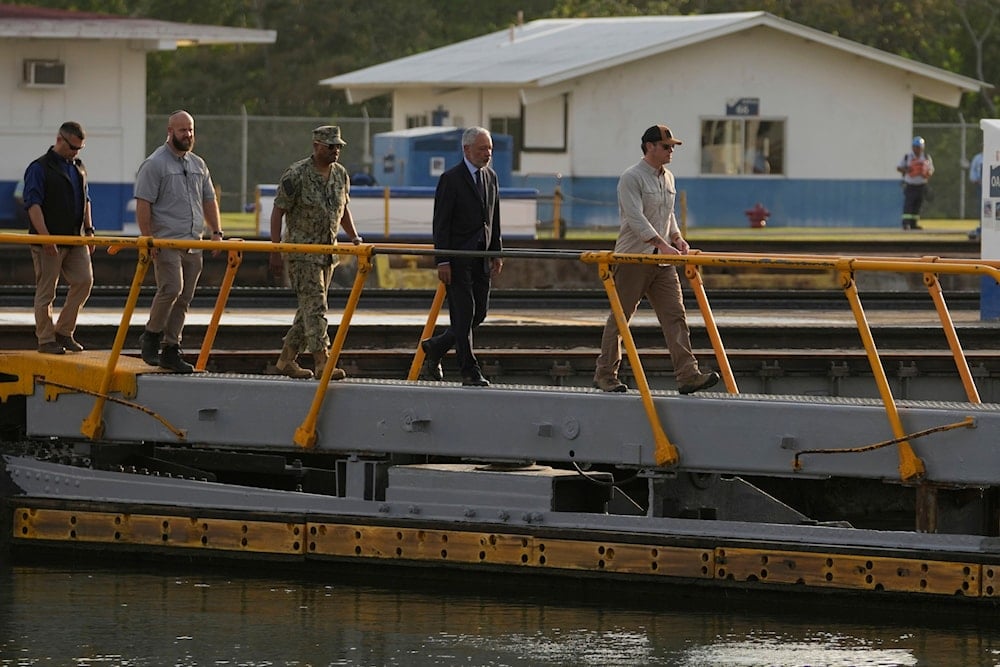US recognizes Panama sovereignty over canal, yet only in Spanish
The new deal revives painful memories of the US military’s presence in the country, particularly the 1989 invasion that overthrew Manuel Noriega and killed more than 500 Panamanians.
-
 US Defense Secretary Pete Hegseth, right, and Panama Canal Authority Administrator Ricaurte Vasquez, second from right, cross a bridge during a tour of the Panama Canal's Miraflores Locks in Panama City, Tuesday, April 8, 2025. (AP)
US Defense Secretary Pete Hegseth, right, and Panama Canal Authority Administrator Ricaurte Vasquez, second from right, cross a bridge during a tour of the Panama Canal's Miraflores Locks in Panama City, Tuesday, April 8, 2025. (AP)
Top security officials from the United States and Panama have signed an agreement that permits US troops to operate at Panamanian-controlled facilities for joint training, military exercises, and “other activities", according to the memorandum signed this week.
While the deal does not authorize the construction of permanent US military bases—an outcome that would likely provoke domestic backlash and legal complications—it does grant Washington wide latitude to deploy an unspecified number of personnel to installations, some of which were originally built during the US occupation of the Panama Canal Zone.
Wider context
The move comes amid renewed scrutiny from US President Donald Trump, who has long criticized what he perceives as China's involvement in Panama and declared his intent to “take back” strategic influence over the canal, which handles approximately 40% of US container traffic and 5% of global trade.
Since returning to office in January, Trump has repeatedly alleged that China holds too much sway over the waterway. “We are helping to take back the Panama Canal from communist Chinese influence,” US Defense Secretary Pete Hegseth said during a press briefing in Panama City.
Hegseth’s visit marked the first by a US defense chief to Panama in decades. Alongside his Panamanian counterpart, Frank Abrego, he signed a Memorandum of Understanding that both deepens military cooperation and affirms Panama’s sovereignty over the canal—a key concern in the wake of Trump’s prior remarks suggesting he would not rule out military intervention.
“In addition, Secretary Hegseth recognized the leadership and inalienable sovereignty of Panama over the Panama Canal and its adjacent areas,” read a Spanish-language statement from Panama’s government. While the line was absent in the Pentagon’s English version, Hegseth echoed the sentiment before departing, saying, “We certainly respect the sovereignty of the Panamanians and the Panama Canal.”
Panama’s Minister for Public Security reiterated the point. “Secretary Hegseth, in the meeting we had in private, recognized the sovereignty of Panama over the Panama Canal,” said Abrego, adding that Panama would not permit permanent US bases.
President Jose Raul Mulino, speaking from Peru, revealed that Washington had initially pushed for base rights under an earlier draft of the deal—a proposal he flatly rejected. “Do you want to create a mess? What we've put in place here would set the country on fire,” Mulino reportedly told Hegseth.
Despite the scaled-back deal, public reaction in Panama has been fierce. “What we have here is a setback to national sovereignty,” said labor leader Saul Mendez. “What the Panamanian government has done is an act of treason. They are traitors and must be tried.”
The controversy revives painful memories of the US military’s presence in the country, particularly the 1989 invasion that overthrew Manuel Noriega and killed more than 500 Panamanians. Washington controlled the canal until 1999.
Chinese port operator under fire amid US pressure
Recent tensions have focused on Chinese business interests in the canal zone. The Hong Kong-based Panama Ports Company, which has operated facilities at both ends of the canal for decades, has come under pressure from the Trump administration. Panama has accused the company of breaching its contract and urged it to exit.
In March, the ports' parent firm, CK Hutchison, announced a $19 billion sale of 43 port assets—including the two Panamanian terminals—to a US-led consortium headed by BlackRock. China has responded with an antitrust investigation.
Though the US has long conducted military exercises in Panama, a continuous rotational force—akin to America’s presence in Darwin, Australia—would be politically explosive in Panama, where sovereignty remains a charged issue.
Still, Hegseth praised Mulino’s alignment with Washington’s strategic goals, especially his administration’s withdrawal from China’s Belt and Road Initiative and cooperation on curbing irregular migration. “We are deeply grateful for the friendship of our Panamanian counterparts, your partnership and your leadership here in Panama and across the region,” Hegseth stressed.
Read more: US threatens Panama over alleged 'China influence' in canal operations

 4 Min Read
4 Min Read









